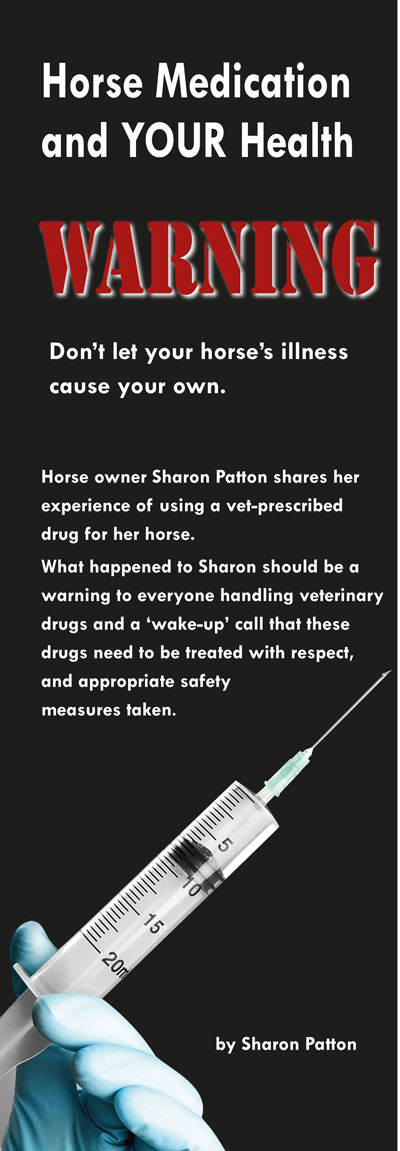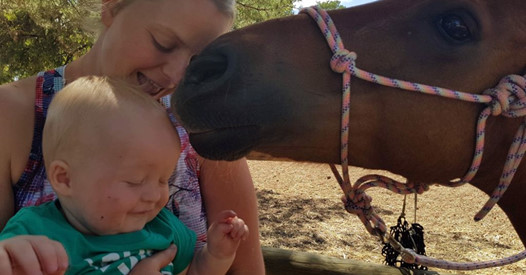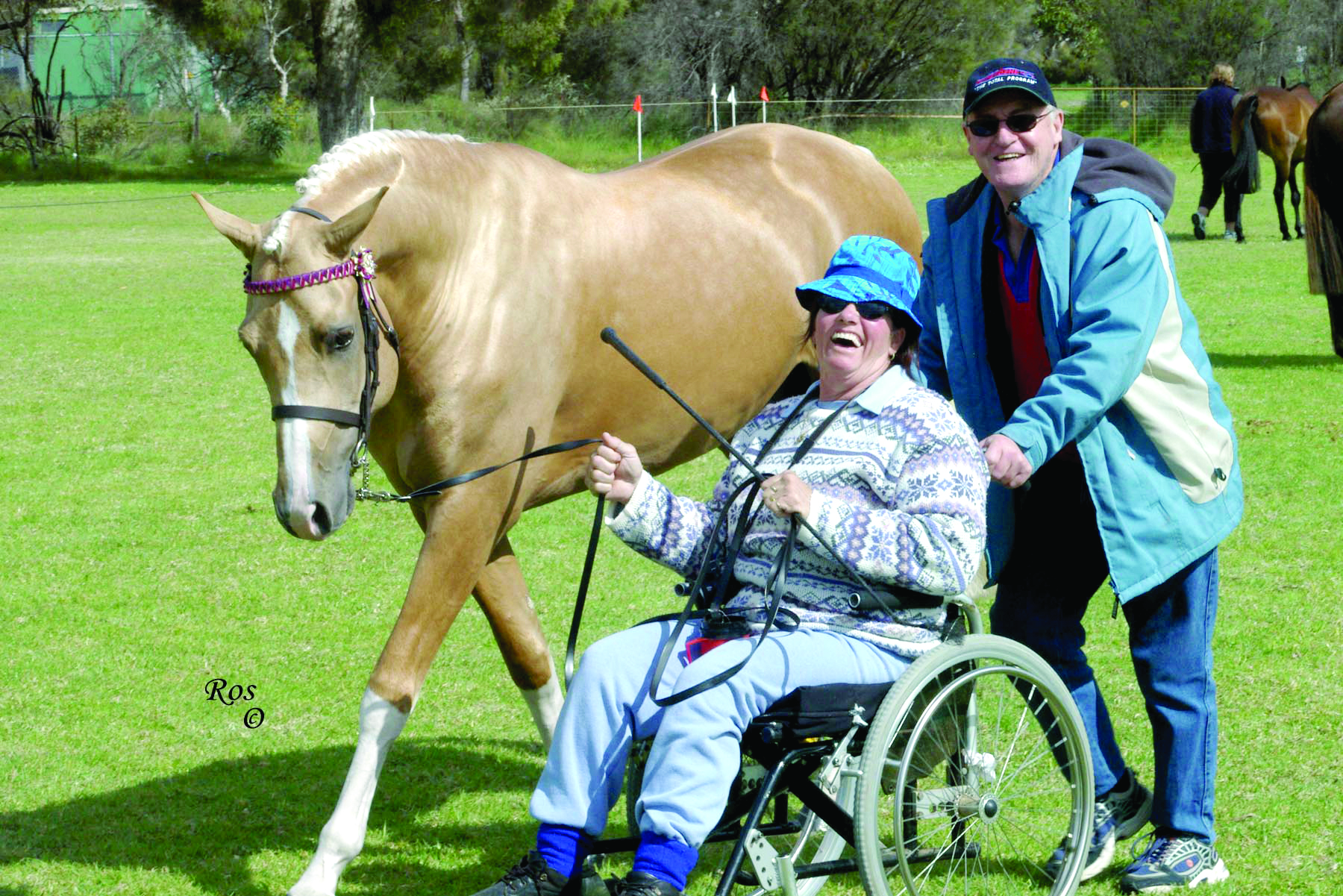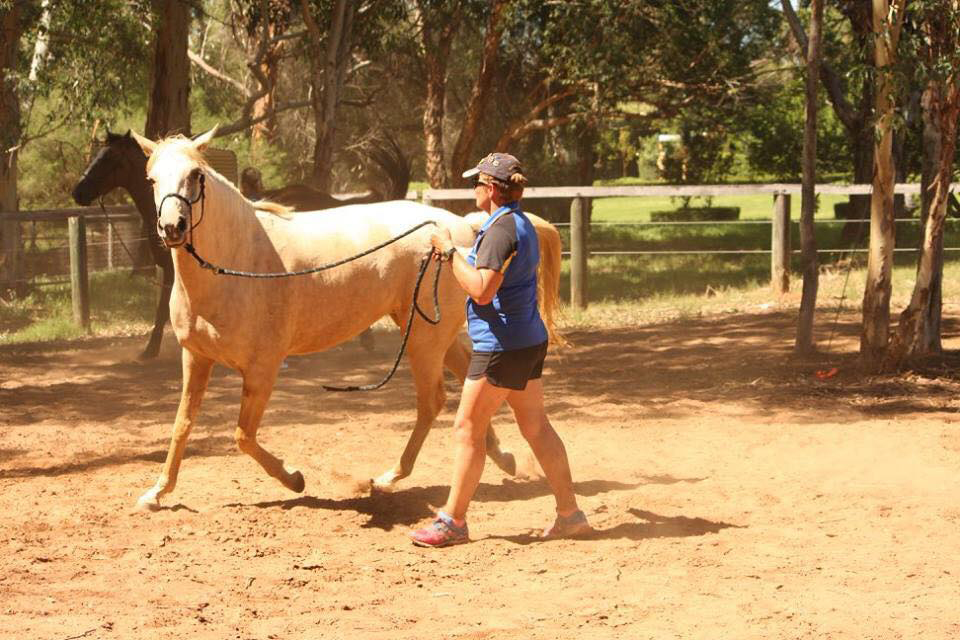|
22/08/2019
HORSE MEDICATIONS & YOUR HEALTH
courtesy of Hoofbeats Magazine
 This Reader’s Story highlighted the importance of correct handling procedures when administering horse medications, something everyone should be aware of, and many readers got in touch to acknowledge their appreciation of the reminder. This Reader’s Story highlighted the importance of correct handling procedures when administering horse medications, something everyone should be aware of, and many readers got in touch to acknowledge their appreciation of the reminder.
The Reader’s Story refers to a horse diagnosed and treated with medication for PPID (Cushing’s disease). We feel it is important to point out, there are two registered products in Australia for the treatment of Cushing’s Disease. Neither of these products were the product used by the author of the article. The available registered products have been approved for safety and efficacy by the independent regulatory body, the APVMA.
For those seeking information on appropriate treatments for horses suffering from PPID (Cushing’s disease), we suggest you speak to your vet for the appropriate treatment to help with relieving your horse’s symptoms and they can contact Ranvet on 1800 727 217 or Boehringer Ingelheim on 1800 226 315 for information.
Sharon, who has a background as a researcher has been campaigning to have more horse owners aware of the need to be diligent in the handling of any drugs when administering them to horses.
In her quest she has contacted
• the Australian Pesticides and Veterinary Medicines Authority about this issue
• her doctor has agreed to spread the word in medical circles.
• the owner of the compounding company has agreed to look at supplying Pergolide with gloves and safety warnings.
• the boss of the Melbourne Equine Dentistry Institution is adding a lecture on drug handling to their training.
• a Murdoch Vet Lecturer has indicated they will be using her example to highlight drug handling and client education to trainee vets.
• all vet clinics she contacted have agreed to educate those handling the drug.
• her farrier is discussing drug handling safety with all his clients.
• a member of the Vet Board has a copy of the article for discussion.
Sharon shared her story to help prevent others who may use any horse drugs without suitable safe handling.
If you have concerns relating to the use of any horse drugs then you should talk to your veterinarian. If relating to pergolide then the Ranvet and Boehringer Ingelheim contact numbers are above. There are also many references on the web related to its use for humans and horses.
21/08/2019
RIDING AFTER BABIES: AN INTERESTING INSIGHT FOR RIDERS BECOMING MUMS
 "I went into having a baby and birth thinking that I would be back riding by six weeks post baby. I had actually planned my first competition back for 8 weeks post-partum. Oh how I was in for a shock! I was a health professional that trained safely until I was 40 weeks pregnant. "I went into having a baby and birth thinking that I would be back riding by six weeks post baby. I had actually planned my first competition back for 8 weeks post-partum. Oh how I was in for a shock! I was a health professional that trained safely until I was 40 weeks pregnant.
I was expecting the sleeplessness and baby blues, but during the process, no one spoke about recovery, incontinence, prolapse or how important the pelvic floor was, other than to do pelvic floor exercises every day. I had a very quick birth with minimal tearing, but because my body had no time to slowly loosen, my pelvic floor was extremely stretched.
I suffered with prolapse post-delivery due to this laxity, incontinence and post-natal depression which was compounded by not being able to ride. I struggled to find evidence-based information that would support my return to horse riding, so I have decided to change that for other riding mums
Click here to read full article
14/08/2019
VALE CAROL WELLS
 With great sorrow and sadness, Equestrian Western Australia would like to offer our condolences to the family of Carol Wells on her passing earlier this week. With great sorrow and sadness, Equestrian Western Australia would like to offer our condolences to the family of Carol Wells on her passing earlier this week.
Carol rode at the 1994 World Para-Equestrian Championships in Hartpury, UK and was awarded Equestrian Western Australia’s honorary life membership at the 2018 Awards Night earlier this year.
13/08/2019
COUNTRY SPORT ENRICHMENT SCHEME
 The Country Sport Enrichment Scheme helps regional Western Australia experience and conduct major sporting events and sport development initiatives. The Country Sport Enrichment Scheme helps regional Western Australia experience and conduct major sporting events and sport development initiatives.
Click here for more information
08/08/2019
HORSE OWNERS REMINDED TO BE AWARE OF HENDRA VIRUS RISK
 While the risk of Hendra virus occurring in Western Australia is low, horse owners need to remain vigilant for the signs of the disease as it is so dangerous when it occurs. While the risk of Hendra virus occurring in Western Australia is low, horse owners need to remain vigilant for the signs of the disease as it is so dangerous when it occurs.
Hendra virus is a fatal disease of horses caused by horse contact with the secretions of flying foxes (fruit bats) that carry the virus. People who have close contact with infected horses, including vets, may also become infected and can die from the disease.
The disease occurs in Queensland and NSW, and with regular movements back and forth across Australia for equestrian events, your horses can potentially be exposed to horses incubating the disease during competitions.
Be aware that flying foxes in northern WA have been found to carry the virus and so have the potential to infect horses.
Read more about steps you can take to reduce the risk of Hendra virus occurring in your horse: http://bit.ly/2YPqabh
|